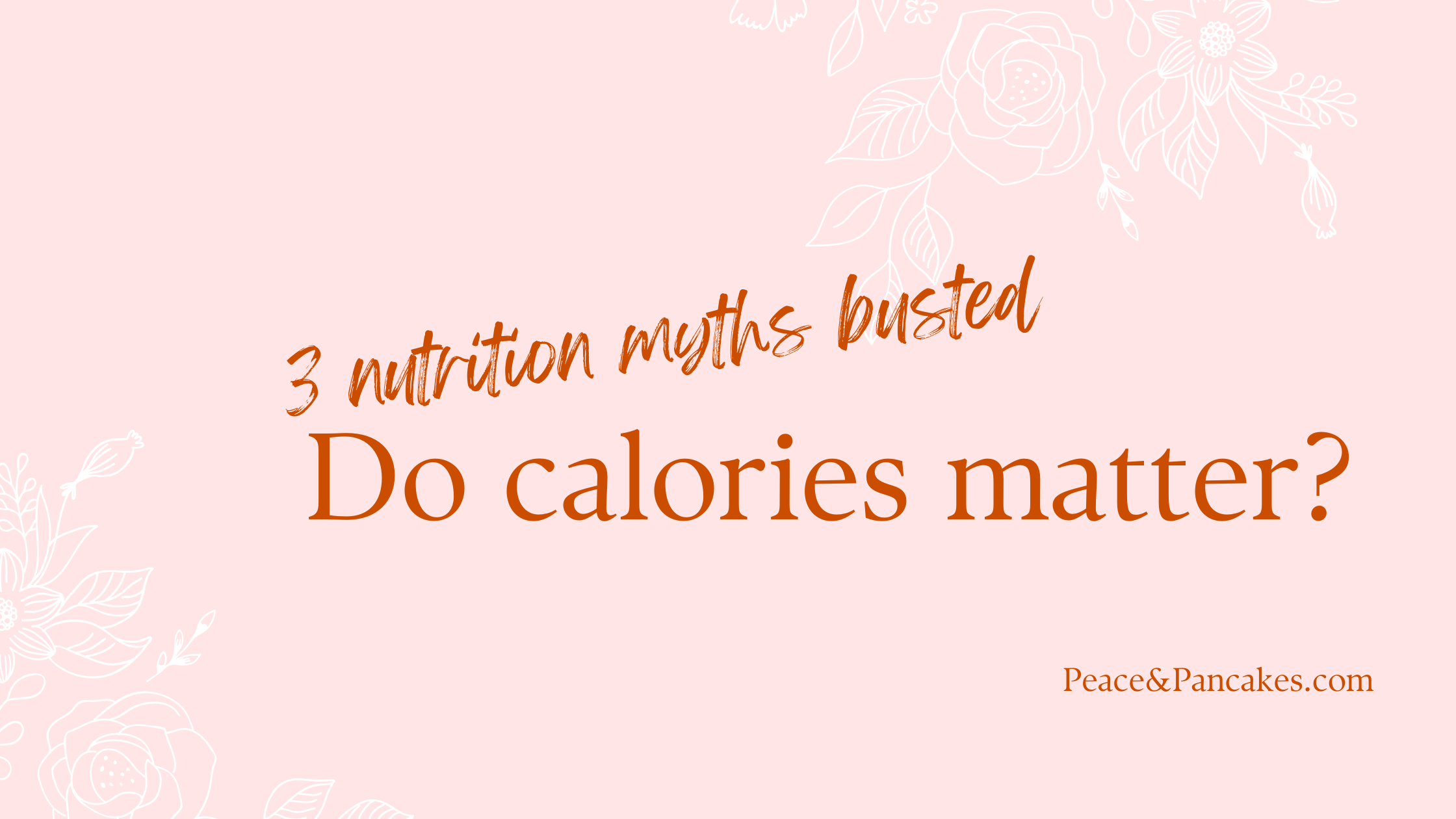3 Nutrition Myths Busted: Do Calories Matter?
All right friends, it’s time to address the elephant in the room.
You might be focusing TOO MUCH on calories, and it could be sabotaging your journey to better health.
I’ve witnessed countless individuals trapped in the calorie-counting maze, feeling perpetually hungry and unsatisfied… and for what?
The relentless pursuit of “calories in vs. calories out” as the holy grail of weight management is leaving many feeling physically and emotionally drained. Not to mention, the results often don’t match the effort.
It’s time to shift your focus from calories to paying attention to what foods truly nourish you.
In this post, I’ll debunk a few myths about calories that will (hopefully) transform how you view food for the better.
Nutrition Myth #1: Calories In vs. Calories Out = Weight Loss
This burns me up every time I hear it.
Don’t get me wrong – a calorie deficit can absolutely lead to weight loss, BUT, it doesn’t tell the whole story. It’s time to break free from the notion that a simple mathematical formula holds the key to your health goals.
During my 6+ years as a dietitian, I can’t tell you how many times I’ve witnessed women following a cookie cutter recommendation for how many calories to eat in a day, but they can’t seem to figure out why the scale isn’t budging.
Well, guess what? That daily calorie goal from your food tracker app is almost ALWAYS way too low to meet your daily nutritional needs. As a result, your metabolism slows down drastically to preserve energy and keep you alive.
I also can’t tell you how many times I’ve helped women STOP focusing on calories and START focusing on eating enough, and they start seeing the results they desire.
Not to mention, they also revive their energy levels, sleep better, decrease food cravings and emotional eating, and improve biomarkers like blood sugar and cholesterol levels.
So don’t let anyone tell you you that you’re not trying hard enough if you’re restricting your calorie intake and not seeing the results that you want.
The truth:
Your body is incredibly good at keeping you alive, and one of the ways it does this is by reserving energy when food intake is scarce. Thus, decreasing calorie intake won’t always lead to weight loss. There are other more important nutritional factors to focus on if you want to improve your health.
Nutrition Myth #2: Lower Calorie = Healthier
This one may be surprising. If you have ever dieted, calories are often a focus. The lower a food is in calories, the more of it you can eat, which ultimately reinforces the message that lower calorie = better.
Consider this – calories can’t tell you anything about a food, aside from just the amount of energy it provides your body.
For optimal functioning, your body needs a mixture of carbohydrate, protein, and fat, as well as a variety of vitamins and minerals. If you’re just focusing on calories, you might be overdoing it on some nutrients and eating too little of others.
For example, if you are an active person, your body needs adequate carbohydrates and protein to perform at its best. Calories can’t tell you how many grams of carbohydrates or protein are in a food!
This is why I focus on helping my clients build a meal plan that has a variety of foods from all food groups and a balance of all the macronutrients at most meals and snacks.
The truth:
Calories can’t tell you how healthy or nutritious a food is. A healthy eating pattern is one that includes adequate carbs, fat, and protein from a variety of foods. It’s super important that you enjoy your food, as well!
Nutrition Myth #3: Counting Calories = Controlling Your Food Intake
I can totally understand why someone would believe this, especially if you have a history of dieting.
I’ve been there myself, and I can tell you that focusing on calorie counting often leads to feeling MORE out of control around food.
Why?
The main reason is that the calorie count on a nutrition label can’t reveal how full and satisfied a particular food will make you feel. This lack of insight can lead to overeating, emotional eating, and a perpetual cycle of dissatisfaction.
Counting your calories can give you a false sense of control around your food intake. It’s a tangible metric you can track and is reinforced by our society.
However, under eating or not eating the right balance of carbs, fat, and protein can lead to frequent hunger, which can trigger cravings and overeating.
Not to mention, if you’re not mentally satisfied with the foods you are eating, you will also be more susceptible to overeating out of rebellion.
The truth:
Focusing only on your calorie intake can remove the satisfaction from eating, which often leads to overeating and feeling out of control around food. Instead of incessantly counting calories, tune in to what foods provide your body lasting satiety and energy.
Why is it misleading to believe these 3 myths?
Believing in these myths can leave you stuck in the yo-yo dieting cycle, blaming yourself when you ultimately “fail.”
I absolutely know you have everything it takes to feel empowered to make satisfying food choices that support your body for optimal functioning and long-term health. You just need the right guidance to succeed. Otherwise, you risk remaining stuck beating yourself up for not reaching your health goals.
Whatever you do, don’t give up!
I’ve seen countless clients achieve their health goals and feel more confident in their bodies without counting calories. There’s nothing mysterious or special about them.
They did it by trusting my guidance and putting in the hard work.
I created this guide that walks you through the process I use to assist my clients with creating a meal plan so they can feel more confident in their food choices without the stress of diet rules.

